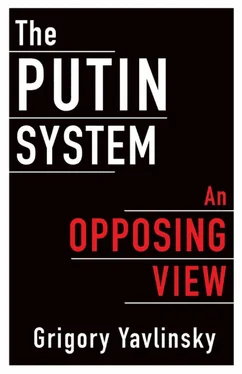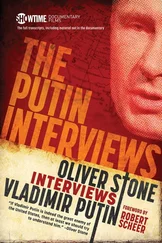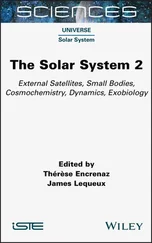Grigory Yavlinsky
THE PUTIN SYSTEM
AN OPPOSING VIEW
To my brave and faithful comrades-in-arms in Russian politics

PREFACE TO THE ENGLISH TRANSLATION
In this book, which builds upon more than a quarter century of my work as both a practicing politician and a scholarly analyst of Russia’s development, I trace the resurgence and consolidation of authoritarian rule in post-Soviet Russia, first under Boris Yeltsin and then under his appointed successor, Vladimir Putin. I make the case for characterizing this regime as a peripheral one, and I do so for two major reasons. First, Russia continues to demonstrate economic and psychological dependence upon leading industrial powers, primarily the United States and Germany, which form the developed core of the world economic system. Second, many of Russia’s policies stem from its leadership’s resentment over being treated as a peripheral player, progressively marginalized within most international institutions and their decision-making on major global and regional issues.
I am fully aware that this argument appears to defy some of the basic elements of the narrative, put forth by mainstream Western media and by policy makers, about Russia as a powerful key player, not just in the world but also in American domestic affairs. In fact, I concur with the view that the Russian government’s involvement in the affairs of the Western world in recent years may have had an impact on these societies that has been far from peripheral, even if it is impossible to quantify with precision. There is mounting evidence of the Kremlin’s interference in the electoral process in the United States and Western Europe and in the inner workings of their democratic institutions, and that the Kremlin did so in support of radical right-wing forces and those seeking to undermine modern societies’ foundational values of socioeconomic progress, social and racial justice, and opportunities for all. Whatever role the Russian government and its proxies played in the victory of Donald Trump in the US presidential elections in 2016—even though, in my analysis, any involvement was secondary to other, internal factors—the very fact of such interference was indeed central to US domestic political developments and foreign policy and hence to the evolution of the core of the world politico-economic system.
And yet, while the impact of Moscow’s actions has definitely put Russia on the front pages of Western newspapers and in prime-time news, where it is likely to remain for the foreseeable future, it does not change the peripheral characteristics and position of Putin’s Russia with regard to the developed industrial powers and the system of world governance that these sustain. In this regard, Russia is broadly comparable to North Korea: while Pyongyang’s existential nuclear threat to the United States and its allies in the region, and potentially to the rest of the world, is central to the present-day international agenda, this in no way qualifies North Korea to be a part of the political core of the world system.
Granted, unlike North Korea, Russia is a veto-holding member of the UN Security Council and wields some influence in parts of the globe on the basis of its military power, and even more so for historical reasons. But, other than that, it is no longer a member of any club of developed industrial powers. And with a 2016 gross domestic product, according to its own official statistics, of less than $1.3 trillion—about 11 percent of the economy of mainland China and smaller than the gross domestic product of Italy or Brazil—Russia constitutes merely 1.8 percent of the world economy.
While Russia’s economically peripheral position and its authoritarianism are historically interrelated, these are two distinct phenomena. They have different implications for the international system and call for different responses from the outside world. This authoritarianism, what I call “peripheral authoritarianism,” is an issue on its own, but one that takes on a unique quality in light of Russia’s economically peripheral status. At present, the combination of these two trends has resulted in antagonistic relations with key Western powers, perhaps the worst in Russia’s modern history, but it doesn’t have to continue in this fashion. Russia may be peripheral or semiperipheral in the world’s economy, but it does not have to be ruled by an inward-looking, xenophobic government whose crony capitalists park their wealth overseas, in the banks and real estate of the developed core countries, while their government hypocritically demonizes and denounces Western ways of life from Russian television screens.
The positive aspects of international relations in the period of détente, during perestroika, and during the first post-Soviet years remind us that Russia is by no means inherently anti-Western and that a different type of relations is a realistic possibility. It is essential for American readers to keep this in mind and to not accept uncritically the media’s stereotypes of the Russian people as falling in line with authoritarian Russian propaganda. This stereotyping ultimately harms, first and foremost, those who are working toward better Russian–American relations and toward a Russia that, politically, would be an integral part of Europe.
It is equally important to realize that a Western response to the Kremlin’s actions that heavily relies on sanctions and other hard-line solutions intended to defang Russia’s authoritarian regime by driving it even further into the global economic periphery is ineffective at best. The latest World Wealth Report shows that, from 2015 to 2016, the number of millionaires in Russia and their total wealth grew by 20 percent—faster than the total for the world—and the growth continued in 2017, though at a lower rate. [1] This data is taken from Capgemini, The Wealth Reports , http://www.worldwealthreport.com . Accessed August 13, 2018.
And such a hard-line approach is highly likely to backfire, by strengthening the regime and hardening nationalistic support for its foreign ventures.
The paradox at play is that while Russia’s peripheral economic position vis-à-vis the developed world is unexceptional and is a matter of concern to Russia only, its political system of peripheral authoritarianism, which is built upon this economic base, has proven to be a significant, if not the driving force behind Russia’s major conflicts and crises in various parts of the world. Some of these situations have an overtly military component (as in Ukraine and Syria), while others, such as those caused by the explosive rise of the radical right in American and European politics, are of a different nature. But all of them are deeply affecting the political systems of the developed “core”—not only tangentially, through the flow of refugees and increased military engagements, but now also directly, by contributing to political upheavals in the United States and Western Europe.
Thus, the apparent attempts by the Putin government or its proxies to intervene in the electoral politics of the developed core of the world system—through hacking computer systems of Western political institutions, leaking their internal information to cause damage to specific candidates (first and foremost to Hillary Clinton) and providing various forms of support for the radical or even not-so-radical right—represents a rather brazen effort to take revenge for the peripheral position and status that Putin’s Russia holds within the political system of global governance. This is the purpose of the Kremlin’s “active measures” to discredit basic European values and to strengthen isolationist and destructive forces in Western societies.
Читать дальше













